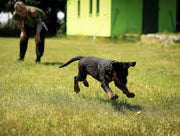
How to clean a dog's ears
As a dog owner, you may be wondering if you need to clean your dog's ears regularly and how to clean dog ears at home. Keeping your dog's ears clean is essential. Some dog breeds may never require an actual ear cleaning, while others will need you to clean them regularly.
Dogs may feel uncomfortable when you try to clean their ears, and I have some tips to make this easier.
When you let dirt and debris build up in your dog's ears, you increase the chance of developing an ear infection. Knowing your way around cleaning your dog's ears will also help you detect early ear infections such as dog ear mites.
If you notice your dog's ears are sore or irritated, your dog may need an ear cleaning. In some instances, dogs develop ear infections or ear mites. Keep reading for how to clean dog ears.
Why do dogs' ears get dirty?

Dog ears are similar to human ears. However, there are some differences:
- Dog ears have a longer ear canal.
- Their ear canal has an L-shape.
Because their ear canal has an L-shape, debris, wax, water, and plants can get trapped in their ears. If you see your dog shaking their head repeatedly, they may be struggling to dislodge something from their ear canal.
Which breeds are prone to dirty ears?
Not all dogs will get dirty ears. However, certain breeds are more prone to dirty ears.
Cocker Spaniels and Shih Tzus have floppy ears that can get dirty over time and need regular cleaning. In general, these breeds may develop more ear conditions than other breeds.
In general, senior dogs may get gunky ears. Senior dogs' skin can thicken, and these dogs are more prone to ear infections, regardless of their breed.
Seasonal and food allergies may cause ear infections

If your dog is prone to itching, scratching, and licking, he may have seasonal or food allergies. I wrote an entire article on 21 natural home remedies you can use to relieve their itching and scratching. Unfortunately, dogs with allergies will develop ear infections more frequently.
I recommend inspecting your dog's food if that's the case to eliminate common food allergens from their diet. I wrote an entire article and method on how to do that! You can read it here.
Food supplementation to reduce ear infections
If your dog is prone to frequent dog ear infections, you may want to supplement their diet. A weakened immune system often causes ear infections. There are many ways to boost your dog's immune system naturally.
You may use the following to boost your dog's immune system and help their ear infection:
- Fish oil. We sell our own. I recommend getting a high-quality one that is Wild Caught in Alaska and tested for purity. Ours is, but you are welcome to do your research!
- Immune-boosting mushrooms. It is not as known as fish oil, but certain varieties of mushrooms are highly beneficial to the immune system. We also happen to sell our blend, but other products are available if you search on Google. Focus on finding a blend made for dogs and, if possible, USDA Certified Organic.
How often should I clean my dog's ears?
It would help if you cleaned your dog's ears regularly. While some breeds may never need cleaning, you should consider cleaning your dog's ears once a month. If your dog has long, floppy ears, you should increase that to twice a month.
Whenever your dog goes swimming or after bathing, ensure to dry your dog's ears. It will help prevent ear infections.
How to tell when a dog's ears need cleaning

While it is essential to regularly groom your dog and clean your dog's ears, you don't want to over-clean your dog's ears. Over-cleaning may lead to ear infections or irritation.
If you notice the following, your dog's ear may need cleaning:
- Visible debris
- Dirty looking skin
- Inflamed or irritated skin
- Smelly: yeasty or stinky
Another good way to tell if you need to clean your dog's ears is if your dog is shaking his head and you notice a mild odor. Contact your veterinarian if you see a significant inflammation and suspect your dog could have an ear infection. Common ear infections include ear mites and allergies.
Do I need to use an ear cleaner?
Yes, it would help if you used an ear cleaner when cleaning your dog's ears at home. However, when choosing an ear cleaner, pick a high-quality one without hydrogen peroxide or alcohol as they may irritate.
Some ear cleaners contain natural antibacterial and antifungal ingredients that may help prevent ear infections. In some instances, dog owners report being able to soothe an infection at home by using a quality ear cleaner. While treating your dog's ear infection at home may be tempting, I always recommend visiting your vet first.
Along with your ear cleaner, you will also need a cotton ball.
How can I clean my dog's ears?

To clean your dog's ears, you will need to gather some ear-cleaning supplies:
- A cotton ball or gauze
- A dog ear-cleaning solution (preferably without hydrogen peroxide or alcohol)
- A towel
Refrain from using Q-tips or anything with a pointed tip, as these can damage your dog's ear canal and push debris further down the canal. But, of course, the same is true for humans.
How to clean dog ears?
Cleaning dog ears is easy but can get messy. I recommend cleaning your dog's ears in a bathroom. Your dog may shake his head vigorously during the cleaning process. Be prepared!
Keep reading for your step-by-step guide on how to clean your dog's ears at home.
How to clean dog ears at home, Step by Step

- You may want to sit on the floor and have your dog between your legs, facing away. If your dog is larger, I recommend positioning him with one side against the wall and you on the other side.
- Gently grab one ear flap and hold your dog's ear flap to expose the inside of your dog's ear canal.
- Squeeze some dog ear cleaning solution in your dog's ear while holding his ear flap. It should be enough to fill the ear canal and spill over. When squeezing, be careful not to insert the tip of the bottle in your dog's ear.
- Gently massage the base of the ear below the opening for about 30 seconds with your other hand while still holding the ear flap. It helps dislodge any debris stuck in your dog's ear canal. You should hear a squishing sound as you do this.
- Wipe away loosened debris from the inside of your dog's ear using the cotton ball or gauze.
- Your dog will naturally want to shake his head. Release the ear flap and let him as it helps move the rest of the debris out of the canal.
- Once again, clean the visible debris and excess cleaning solution using a cotton ball or gauze.
- Do one last sweep of the ear canal with a cotton ball or gauze, but don't go further than where your finger can go. Never use Q-tips.
- While doing this, reward your dog with treats and petting or praise.
- Repeat with the other ear.
- Contact your veterinarian if you notice visible skin irritation or coffee ground-like debris or if your dog seems in pain during the cleaning process.
Get your dog comfortable with the "Ear Cleaning Position"
To make the ear cleaning process more manageable, you will want to position your dog in the "ear cleaning position."
If you have a small to medium-size dog: sit on the floor and position your dog in front of you, facing away. Your legs should be around him.
If you have a larger dog: position him sitting with one side against a wall and his other side against you. You may sit or stand depending on your dog's side.
When should I take my dog to the vet for ear problems?
If you notice that your dog has the following symptoms, you should go to the vet:
- Dog tilting his head left and right.
- Dog shaking his head.
- Dog scratching his ears.
- Dog rubbing his ears.
- Hot, smelly, waxy ears.
- Crusty, scabby, red, irritated ear skin.
You may first attempt to clean your dog's ears at home, and if symptoms persist, contact your veterinarian.
Pick tools for cleaning dog ears

Before you start cleaning your dog's ears, make sure to have the following tools ready to use:
- Ear cleaning solution. Pick one with many positive reviews and without hydrogen peroxide or alcohol.
- Cotton balls and cotton pads. Cotton pads will be helpful for the outside of the ear, while cotton balls will be more convenient for the inner ear.
- Clean towel. It will be helpful to dry your dog's ears once you are finished cleaning them.
- Treats for your dog. Reward your dog after cleaning each ear.
How can I tell if my dog has an ear infection?
If you suspect your dog may have an ear infection, contact your veterinarian. Typically, an ear infection in a dog will show through inflamed skin or coffee ground-like residue when wiping the inside of your dog's ear. However, if your dog keeps shaking his head and scratching his ears despite your recent ear cleaning, you should take your dog to see your veterinarian.
Do all dogs need to have their ears cleaned?
All dogs don't need to have their ears cleaned. However, dogs with large, floppy ears will be prone to developing dirty ears and require the most frequent cleanings.
Should you use hydrogen peroxide to clean dog ears?

No, you should not. You should also avoid using Apple Cider Vinegar. Hydrogen peroxide and apple cider vinegar may irritate healthy skin cells.
No. Don't use hydrogen peroxide on your pup. This standard household product can irritate healthy skin cells. Ears contain susceptible tissue, and extended use of hydrogen peroxide could eventually damage the ear itself. Stick to veterinarian-approved cleaners.
What are some ear cleaning "dos" and "don'ts"?
Do:
- Use an ear cleaner made for dogs.
- Reward your dog during and after cleaning.
- Be gentle.
Don't:
- Don't use Q-tips. It may damage the ear canal or ear drum.
- Don't use water to clean your dog's ears.
- Don't pluck your dog's ear hair. If you think this is necessary, ask your vet first.




